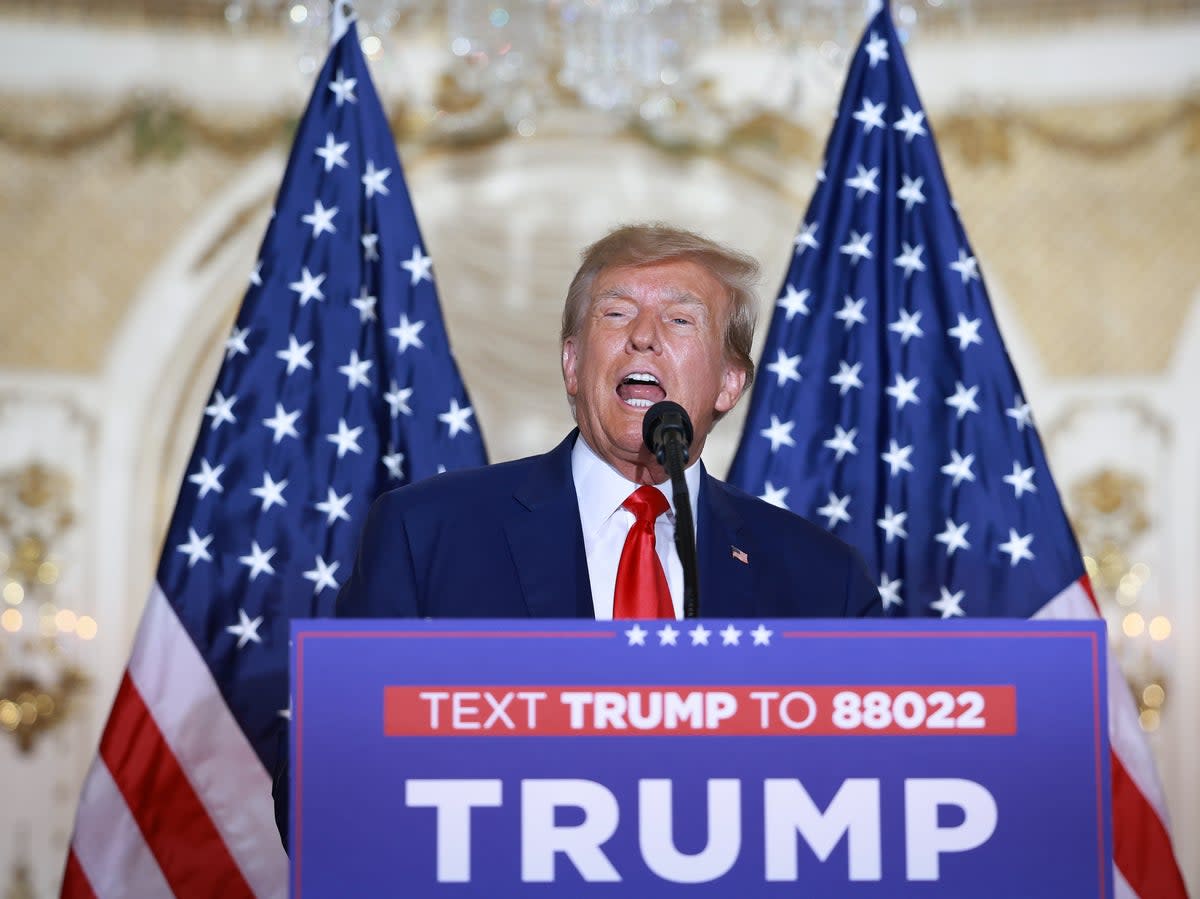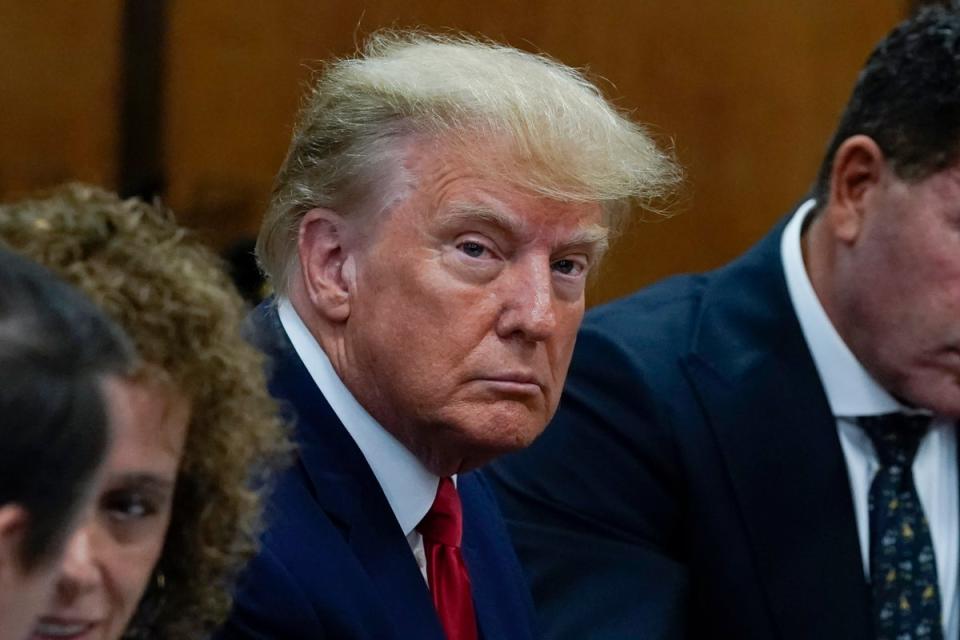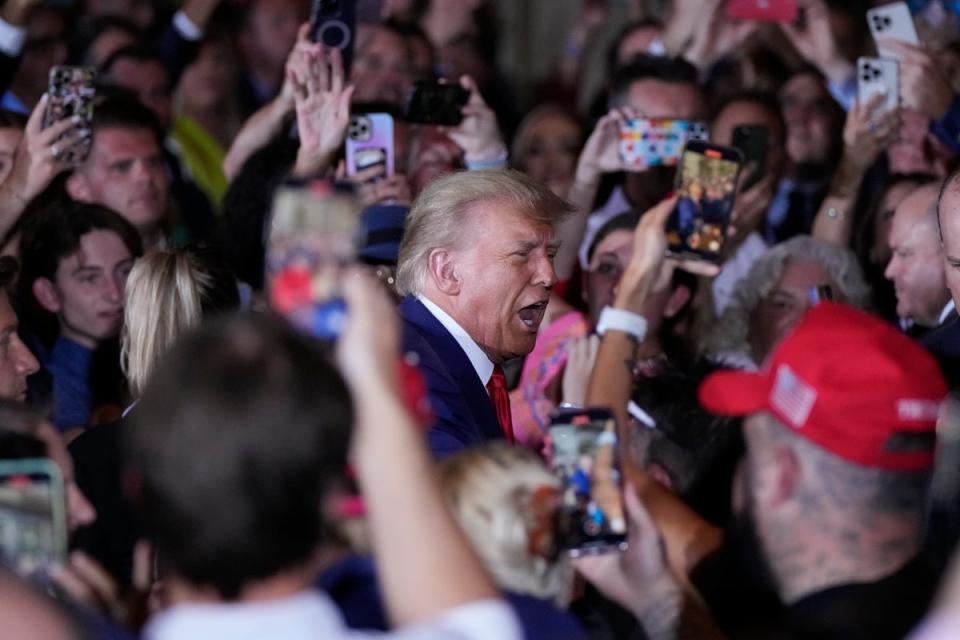Many before him have tried and failed, but could a New York judge finally force Donald Trump to shut up?

- Oops!Something went wrong.Please try again later.
- Oops!Something went wrong.Please try again later.
- Oops!Something went wrong.Please try again later.
Donald Trump’s arraignment in Manhattan on Tuesday was remarkable for many reasons; not only was it the first time a former US president has ever been arrested, it was also a media spectacle on a scale unheard of before, even in New York.
But there was another first during the proceedings, lesser noticed, that could have profound implications on the next election and beyond. It raises the prospect that a New York judge may succeed where many others have tried and failed, and force Mr Trump to be quiet.
The moment came when the matter of Mr Trump’s incendiary social media posts about the case, and the district attorney prosecuting it, were brought to the attention of the court. As Mr Conroy handed printed copies of the former president’s posts from his Truth Social website to the judge and defence counsel, he decried “a series of threatening public statements to the District Attorney’s Office” made by Mr Trump, among them “a picture that depicts Mr Trump wielding a baseball bat at the head of the District Attorney.” He then accused the former president of “threatening our city, our justice system, our courts, and our office.”
Judge Juan Merchan appeared concerned. He urged the defence counsel to “speak to your client and anybody else you need to, and remind them to please refrain from making statements that are likely to incite violence or civil unrest” and to “not engage in words or conduct which jeopardises the rule of law, particularly as it applies to these proceedings in this courtroom.”
He also offered a warning.
“This is a request I’m making. I’m not making it an order. But now that I have made the request, if I were to be handed something like this again in the future, I have to take a closer look at it,” he said.
Judge Merchan chose his words carefully, and for good reason. Mr Trump is not only a former president, but a current candidate for the next presidential race — a frontrunner, even. A gag order in this case would have to weigh the First Amendment rights of a presidential candidate and the judge’s duty to ensure a fair trial.
He made clear that he understood the weight of such an order.
“Certainly, the Court would not impose a gag order at this time even if it were requested,” he said, following the district attorney’s office sharing of Mr Trump’s social media posts.
“Such restraints are the most serious and least intolerable on First Amendment rights. That does apply doubly to Mr Trump, because he is a candidate for the presidency of the United States. So, those First Amendment rights are critically important, obviously,” he added.
Judge Merchan’s warning had little to no effect. Just hours after he had sat deferentially in the New York courtroom, Mr Trump held a press conference at his resort in Mar-a-Lago, Florida, where he again blasted district attorney Bragg, and went even further, this time complaining about the judge and the judge’s daughter.

On the day of the arraignment, Donald Trump Jr, Mr Trump’s son, also shared an article about the judge’s daughter working for Kamala Harris’s campaign, including a photograph.
“I have a Trump-hating judge with a Trump-hating wife and family whose daughter work[ed] for Kamala Harris,” Mr Trump said at Mar-a-Lago. “The criminal is the district attorney because he illegally leaked massive amounts of grand jury information, for which he should be prosecuted, or at a minimum he should resign,” he continued.
The speech indicated that Mr Trump would likely not temper his words when it came to this case. That has left the judge with a series of difficult questions: Does he now attempt to impose a gag order on the former president? And what would such an order look like in these unique circumstances? Is it fair to restrict a presidential candidate’s speech on a matter that he believes is central to his next campaign? And what would be the penalty if Mr Trump, as he is wont to do, continues to let loose?
Michael Bachner, a former assistant district attorney in the Rackets Bureau of the Manhattan District Attorney’s Office and white-collar criminal defence attorney, told The Independent that far from being persecuted by the judge, he was being treated unlike any other defendant.
“Candidly, if this were not Donald Trump, if this were a regular defendant, most judges — including Judge Merchan — would’ve had that person back in court the next day or shortly thereafter with issuing a formal order,” he said, referring to his Mar-a-Lago speech.
“As a result of what Trump did at Mar-a-Lago, the court may at this point feel compelled to take an additional step and issue a gag order or a partial gag order,” he added. “It may be that the prosecution has already written a letter to the judge to have them consider doing that.”
The effect of Mr Trump’s rhetoric was almost instantaneous. On Thursday, NBC reported that the judge and his family received multiple threats in the 24 hours after the arraignment. One official said “dozens” of threats were issued directly at Judge Merchan over an unspecified timeframe.
If Mr Trump’s Mar-a-Lago speech, given after the judge’s warning, forces the judge to act, he will be walking through a constitutional, political and legal minefield. He will be tasked with crafting an order that weighs the rights of a presidential candidate to speak with complete freedom on a national platform, and a defendant issuing threats or statements that may influence the outcome of a trial.
It would be the first time in history that a presidential candidate would have been issued with such an order. As a result, no one quite knows what it would look like.
“The court could say, ‘Mr Trump, I am advising you presently. You may make no public statements whatsoever regarding the judge, the prosecution, the prosecution’s family, you may not discuss the facts of the case publicly,’” said Mr Bachner.
“Look, when you’re a defendant in a criminal case don’t have the rights that other individuals have. And it is extremely common in a criminal case for there to be restrictions placed on defendants,” he added.
Norm Eisen, a lawyer and House Judiciary Committee co-counsel in Trump’s first impeachment trial who has written extensively about the case, said any order issued by the judge would likely be “very narrowly tailored to prevent threats of violence—or inciting it.”
“It would most likely apply to those directly involved in the case: prosecutors, witnesses, court personnel, and of course their families. It would not otherwise restrict Mr Trump’s speech, including about the case, as long as he’s not triggering violence.” he said.
An order targeting the threat of violence “should not inhibit Mr Trump from freely running for office and even talking about the case,” Mr Eisen added. “He can do that, and stick to the merits, without using terms like ‘death & destruction’ or putting up images of him swinging a baseball bat at DA Alvin Bragg’s head. That kind of thing is far beyond the legitimate parameters of what a political candidate needs to be able to say to run irrespective of whether they are a criminal defendant.”
Such an order could be crafted, he said, without restricting the First Amendment rights of the former president.
“The reality is that this and other potential future prosecutions of Mr Trump, which I believe are coming, are important issues for the public. So there is First Amendment protection, but that does not extend to threatening violence,” he said.

Republicans have already signalled that they would treat such an order as an outrage. House Judiciary Committee Chairman Jim Jordan and House Oversight and Accountability Committee Chairman James Comer, both Republicans, said Tuesday that a gag order would be "unconstitutional”.
"To put any restrictions on the ability of President Trump to discuss his mistreatment at the hands of this politically motivated prosecutor would only further demonstrate the weaponization of the New York justice system," the lawmakers said in a statement.
Any potential order focusing on preventing unrest would be incredibly unique, according to Jay Schwitzman, a criminal lawyer from Brooklyn.
“The judge was walking the line of saying, ‘Okay, I’m not going there. But I will go there and consider it if there are expressions of inciting violence,’” he told The Independent.
“A gag order in and of itself is rare, and thrown in the fact that creating civil unrest as an element to be considered, that has never occurred, and then the added element of him running for election,” he added.
“All of this will be studied and written about for years to come because there are so many intertwining issues.”

